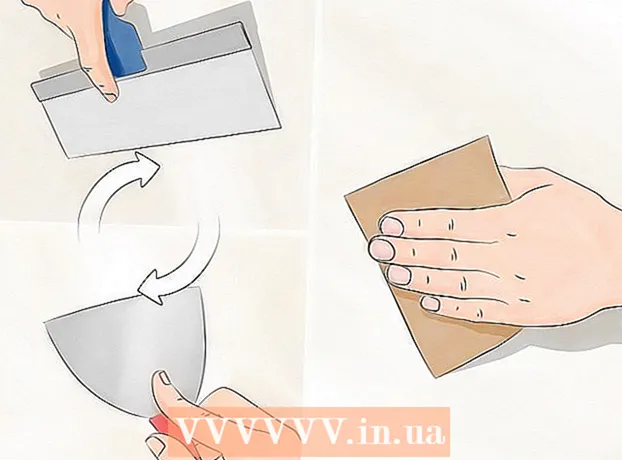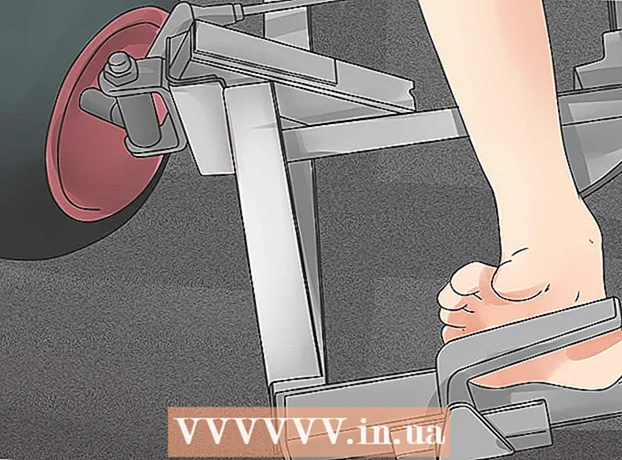Author:
Mark Sanchez
Date Of Creation:
4 January 2021
Update Date:
1 July 2024

Content
- Steps
- Method 1 of 3: Relieve nighttime itching
- Method 2 of 3: Natural remedies
- Method 3 of 3: Treating Special Cases
- Tips
- Warnings
- What do you need
Itching can be caused by a variety of causes, such as allergies, insect bites, eczema, or a poison ivy rash. If left untreated, nighttime itching can lead to insomnia, and constant scratching can cause infection and scarring. This article explains how to deal with itching at night.
Attention:the information in this article is for informational purposes only. Check with your healthcare professional before using any medication.
Steps
Method 1 of 3: Relieve nighttime itching
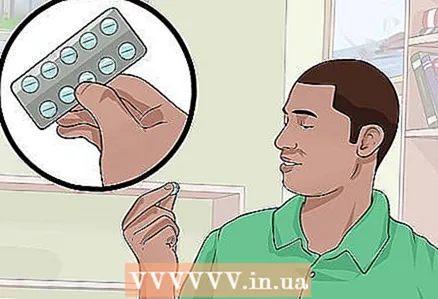 1 Use topical or oral antihistamines. Antihistamine creams and pills relieve itching caused by an allergic reaction. They prevent histamines from attaching to cells and thus inhibit the release of neurotransmitters that cause allergy symptoms, including itching.
1 Use topical or oral antihistamines. Antihistamine creams and pills relieve itching caused by an allergic reaction. They prevent histamines from attaching to cells and thus inhibit the release of neurotransmitters that cause allergy symptoms, including itching. - Apply diphenhydramine gel ("Psilo-balm") to the skin or take tablets ("Diphenhydramine") before bed. Diphenhydramine not only relieves itching, but also induces drowsiness, which will help you sleep better at night. Keep in mind that Diphenhydramine is only dispensed at the pharmacy with a doctor's prescription.
- If you are experiencing itching in more than a few places, it is best to take oral medications so as not to apply the balm to large areas of the skin.
- Use either a balm or an oral preparation with diphenhydramine.Do not use them together under any circumstances, as this can lead to overdose.
- Be sure to follow the directions for use and never exceed the recommended dosage.
- Other over-the-counter antihistamines such as cetirizine (Zyrtec) and loratadine (Claritin) can also be used.
- Before taking oral medications, be sure to check with your doctor or pharmacist if you have any other medical conditions or are allergic to certain medications, or if you are taking other medications.
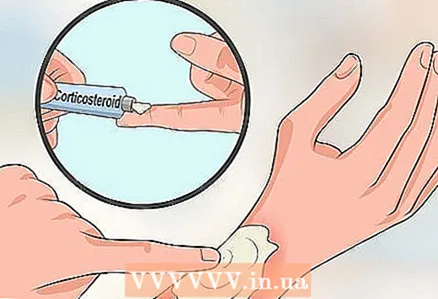 2 Apply a corticosteroid cream to the affected area. Corticosteroids affect the functioning of cells and various substances in the skin and thus effectively reduce inflammation. If itching is caused by an inflammatory condition such as eczema, try a corticosteroid cream.
2 Apply a corticosteroid cream to the affected area. Corticosteroids affect the functioning of cells and various substances in the skin and thus effectively reduce inflammation. If itching is caused by an inflammatory condition such as eczema, try a corticosteroid cream. - When using a corticosteroid, a damp cotton cloth moistened with water can be applied on top to help the skin absorb the cream.
- Over-the-counter creams and more potent prescription corticosteroids are available on the market.
- If you are itchy on a small area of your skin, your doctor may prescribe calcineurin inhibitors, such as Protopic or Elidel, instead of corticosteroid creams.
 3 Apply a moisturizer, barrier cream, or anti-itch cream to itchy skin. This can help you manage mild itching if you don't want to use prescription or over-the-counter drugs. Apply a moisturizer before bed, or at least twice a day if itching continues for a long time until the unpleasant symptoms are relieved.
3 Apply a moisturizer, barrier cream, or anti-itch cream to itchy skin. This can help you manage mild itching if you don't want to use prescription or over-the-counter drugs. Apply a moisturizer before bed, or at least twice a day if itching continues for a long time until the unpleasant symptoms are relieved. - Try products such as Cetaphil, CeraVe moisturizers, or Aveeno's oat-infused beauty products.
- Calamine and menthol are also good remedies for itching. They help to temporarily relieve unpleasant symptoms.
- Zinc oxide, lanolin or petrolatum creams form a protective barrier on the skin. For example, petroleum jelly is an inexpensive emollient that helps with itchy and dry skin.
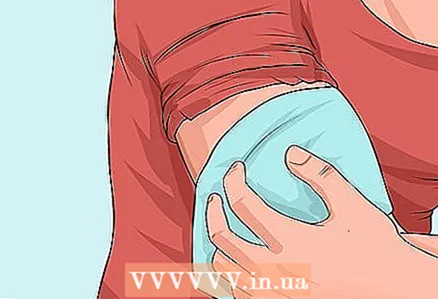 4 Apply cool, moist compresses to the itchy area. This will not only help reduce irritation, but it will also protect your skin and prevent it from scratching at night.
4 Apply cool, moist compresses to the itchy area. This will not only help reduce irritation, but it will also protect your skin and prevent it from scratching at night. - When itching, you want to scratch the irritated area, but try not to do this. Continuous scratching of the skin can damage it, increasing the risk of infection. If you find it difficult to keep from scratching, cut your nails short or wear gloves at night.
- You can also use plastic wrap on the itchy area to avoid scratching it at night.
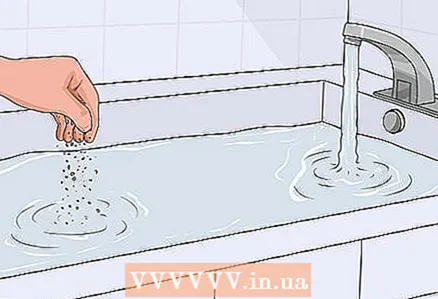 5 Take a warm oat or baking soda bath before bed. Oats contain avenanthramides, natural antioxidants that reduce inflammation and redness of the skin and help relieve itching.
5 Take a warm oat or baking soda bath before bed. Oats contain avenanthramides, natural antioxidants that reduce inflammation and redness of the skin and help relieve itching. - Grind the oatmeal in a blender and gradually pour into the tub while it draws water. After that, soak in the bath for at least 15 minutes before going to bed.
- You can also use a commercially available oat-based bath product, such as from Aveeno. These products are available over the counter and are easy to use.
- Try adding 1 cup (230 grams) of baking soda to a warm water bath and submerging the irritated skin part in the solution for 30-60 minutes before going to bed.
- Itching in some areas can also be relieved with a baking soda paste. Mix 3 parts baking soda and 1 part water and apply the resulting paste to your skin. Do not apply the paste to cuts or open wounds.
 6 Wear loose cotton or silk pajamas at night. These materials help reduce skin irritation. Avoid clothing that irritates the skin (wool and some synthetic materials). It is also advisable not to wear tight and tight clothing.
6 Wear loose cotton or silk pajamas at night. These materials help reduce skin irritation. Avoid clothing that irritates the skin (wool and some synthetic materials). It is also advisable not to wear tight and tight clothing.  7 Do not use something that can irritate your skin at night. Certain items and products, such as jewelry, perfumes, highly scented leather products, detergents and cosmetics, can cause irritation and an allergic reaction. Do not use them at night.
7 Do not use something that can irritate your skin at night. Certain items and products, such as jewelry, perfumes, highly scented leather products, detergents and cosmetics, can cause irritation and an allergic reaction. Do not use them at night. - When washing pajamas and bed linen, use an odorless detergent and turn on the extra rinse cycle on the washing machine.
Method 2 of 3: Natural remedies
 1 Apply lemon juice to the irritated area. Lemons contain aromatic substances that have anesthetic and anti-inflammatory properties. Apply lemon juice before bed to relieve itching and sleep better.
1 Apply lemon juice to the irritated area. Lemons contain aromatic substances that have anesthetic and anti-inflammatory properties. Apply lemon juice before bed to relieve itching and sleep better. - Squeeze undiluted lemon juice onto the itchy area and wait for it to dry before going to bed.
- However, keep in mind that lemon juice can cause tingling and burning, so use it with caution to treat irritated skin.
 2 Try juniper berries and cloves. The combination of anti-inflammatory volatiles in juniper berries and eugenol (a substance that relieves nerve endings) in cloves will help alleviate nighttime itching.
2 Try juniper berries and cloves. The combination of anti-inflammatory volatiles in juniper berries and eugenol (a substance that relieves nerve endings) in cloves will help alleviate nighttime itching. - Melt 60 grams of unsalted butter and 2 tablespoons (30 grams) of beeswax in separate bowls.
- When the beeswax melts, mix it with the melted butter.
- Add five tablespoons of ground juniper berries and three teaspoons of ground cloves and mix well.
- Wait for the mixture to cool and apply it to the irritated skin area before bed.
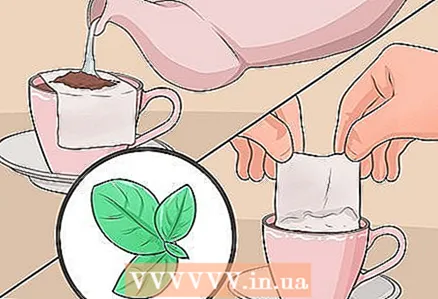 3 Try to relieve itching with herbs such as basil, mint, or thyme. The substances they contain have analgesic and anti-inflammatory properties that help relieve itching.
3 Try to relieve itching with herbs such as basil, mint, or thyme. The substances they contain have analgesic and anti-inflammatory properties that help relieve itching. - Brew mint, basil or thyme tea by pouring boiling water over dry leaves or a herbal tea bag. Cover the container to trap the aroma, wait for the tea to cool and strain. Dampen a clean rag with tea and place it over the irritated area before going to bed.
 4 Apply aloe vera gel to the irritated area. Aloe vera is often used to treat burns. Its substances not only reduce inflammation and prevent blistering, but also relieve itching.
4 Apply aloe vera gel to the irritated area. Aloe vera is often used to treat burns. Its substances not only reduce inflammation and prevent blistering, but also relieve itching. - Apply aloe vera gel to the irritated area before bed.
 5 Take fish oil supplements. They contain essential fatty acids that the body needs to help moisturize the skin. If itching is caused by dry skin, try taking fish oil supplements regularly.
5 Take fish oil supplements. They contain essential fatty acids that the body needs to help moisturize the skin. If itching is caused by dry skin, try taking fish oil supplements regularly.
Method 3 of 3: Treating Special Cases
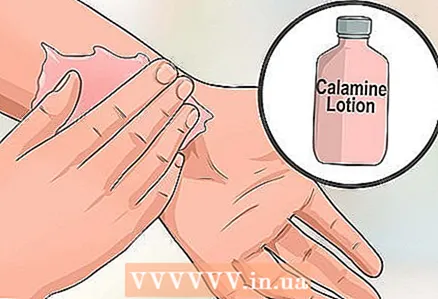 1 Nighttime itching can be associated with a rash after touching certain plants, such as poison ivy or sumach. The oil in these plants irritates the skin and causes itching.
1 Nighttime itching can be associated with a rash after touching certain plants, such as poison ivy or sumach. The oil in these plants irritates the skin and causes itching. - Apply Calamine lotion or hydrocortisone cream to the irritated area before bed.
- You can also take oral antihistamines before bed or apply a cream to your skin.
- If the reaction is severe, the dermatologist may prescribe a steroid ointment or oral prednisone.
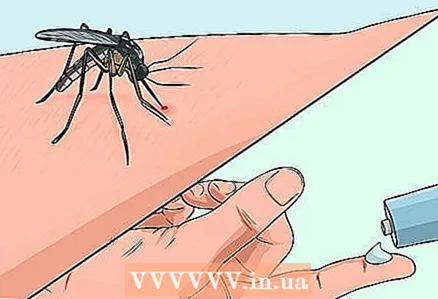 2 Treat insect bites. Itching is often caused by insect bites, especially in the summer. For minor bites, you can wash the affected area with soap and water and apply an anti-itch cream before bed.
2 Treat insect bites. Itching is often caused by insect bites, especially in the summer. For minor bites, you can wash the affected area with soap and water and apply an anti-itch cream before bed. - If the bite is sore or swollen, apply a hydrocortisone, pain reliever, or antihistamine cream before bed.
- To reduce the urge to scratch the bite site, apply a cold compress to it before bed.
 3 Treat eczema. Eczema (atopic dermatitis) is accompanied by a variety of symptoms, including itching. To relieve eczema-related itching at night, try the following remedies:
3 Treat eczema. Eczema (atopic dermatitis) is accompanied by a variety of symptoms, including itching. To relieve eczema-related itching at night, try the following remedies: - corticosteroid creams and ointments (over-the-counter or prescription);
- oral antihistamines such as diphenhydramine;
- skin-healing creams such as Protopic or Elidel.Since these drugs can cause side effects, they should only be used if other remedies have not helped.
 4 Cure bathers itch. This is the name of a skin rash caused by an allergic reaction to microscopic parasites present in polluted water. If nighttime itching is caused by this cause, try the following methods:
4 Cure bathers itch. This is the name of a skin rash caused by an allergic reaction to microscopic parasites present in polluted water. If nighttime itching is caused by this cause, try the following methods: - Apply cold compresses to the affected area to relieve irritation;
- Bath with Epsom salts, baking soda, or oats before bed.
- Apply a corticosteroid ointment or anti-itch cream to the affected skin.
Tips
- You can also take an over-the-counter non-steroidal anti-inflammatory drug (NSAID) such as ibuprofen to help relieve itching at night.
- Try a soothing tea or sleeping pill before bed to help you sleep better at night.
Warnings
- If you are concerned about your skin condition or if itching does not go away within a few days, see your doctor. Your doctor will not only recommend how to relieve itching, but will also help determine the cause and treat the underlying condition.
- In rare cases, itching can be a sign of internal diseases such as the liver or thyroid gland.
- Take over-the-counter and prescription drugs according to the directions for use and never exceed the recommended dosage.
- Consult your doctor if you are unsure of what medications to take, if you have any medical conditions or allergies, if you are pregnant, breastfeeding or taking other medications.
What do you need
- Corticosteroid ointment and / or antihistamine cream
- Oral antihistamine
- Cold compress
- Oatmeal or baking soda for bath
- Silk or cotton pajamas
- Fish Oil Supplements

